Tansy Rayner Roberts's Blog, page 134
September 16, 2011
Synonyms for Housekeeping
For regular listeners/subscribers to Galactic Suburbia who listen through iTunes, this will make exactly no change at all (thank goodness!) but we've recently moved over to Podbean which allows us delicious crunchy stats, and also should make it easier for listeners who prefer to download directly. So check out our new Galactic Suburbia site! Kudos to our producer for spending a ridiculously long amount of time uploading every single episode to the new place and making it comfy for us. Still a few details to be ironed out, but it's lovely to be there.
Meanwhile, I've been beetling around my blog, creating a Guide to the various series of posts I have published or have recently been publishing, because sometimes the tags system doesn't quite cut it. I may have missed some out, but it's a good start!
Also, though I feel a little embarrassed doing this again so soon, another feminist icon has been saying awesome things about my book Love & Romanpunk on the internet, and I would be remiss if I did not point you towards the stirring words of L. Timmel Duchamp of the fabulous Aqueduct Press. [and speaking of Aqueduct Press, does this not sound like the most intriguing and fun set of submission guidelines?]
Finally, in case you missed it, I guest posted on my Indie Press journey over at Tehani's Fablecroft blog.
September 15, 2011
Watching New Who: Season One Report Card
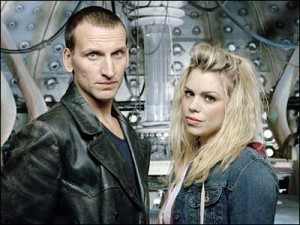 Tehani's S1 Report Card
Tehani's S1 Report Card
David's S1 Report Card
Tansy's Season One Report Card:
The Doctor: I'm sad he didn't stay longer. Eccleston brought a brilliant combination of gravitas and girning comedy to the role, and answered the question of what a 21st Century Time Lord would be like. It would have been cool to see how he would have taken the character in a second season, but maybe it's good that we only had this one to remember him by. He burned fast, and hard, and while my heart now belongs to Matt Smith's Eleven, I will always love poor, broken, cranky Nine.
The Companions:
Rose Tyler: I liked Rose from the start, and I think she really earns her keep in this season which works so hard to show the contrast between the old, haunted war veteran Doctor and the young, bolshy human. She is still absolutely the template for a good modern companion: up for anything, someone who would run into the TARDIS at full pelt because the universe is an exciting place.
Adam Mitchell: Entertaining while he was there, but really he only served the purpose to prove that not everyone can be a companion. I'm sad they never brought him back as I think he could have proved a solid villain with a motive we can all get behind: sometimes, the Doctor is an arse.
Jack Harkness: Oh, Jack. Mysterious, banterific and happy to flirt with anyone and anything. I do love him. He prevented the Doctor-Rose relationship from getting too earnest and helped them both find the fun. He always got the best lines. And in return, they left him alone on a Dalek-destroyed space station. DID I MENTION THAT SOMETIMES THE DOCTOR IS AN ARSE? There are some things that even a spin off series don't make up for.
Recurring Characters:
Jackie Tyler: I always remember how funny and adorable she is, and forget that she can actually be a hard-nosed bitch, so those bits always take me by surprise – like in "Rose" where she comments that working in a shop was giving Rose airs and graces, and a butchers shop would be more suitable. She can cut people down with a word or a glance, even her own daughter, but all that of course comes from the sadness in her life. Camille Coduri did a fantastic job to present a character who was cartoon caricature one minute, and heartbreaking the next. I miss her popping up in the show!
Mickey Smith: I don't love him as much in this season as later, but he has his moments here. My favourite is still when he asks the Doctor not to tell Rose he doesn't want to come with them, and the Doctor conspires with him to make it look like he's the one shutting Mickey out. A great, rare moment of understanding between the two men. I also like the banter when he joins the gang in Boom Town, and his yellow truck heroics at the end.
What is your favourite episode of this season?
The Empty Child/The Doctor Dances
Least favourite episode?
The Unquiet Dead
Favourite guest performance?
Florence Hoath (Nancy)
Describe this season in one word!
Frenetic!
Grade: If you'd asked me a few years ago I would have given it an A, no question, but the last few years have upped the game so much, that I have to bring it down in comparison. It's still a favourite I return to again and again. B+
Friday Links Don't Have Enough Lesbians In Them.
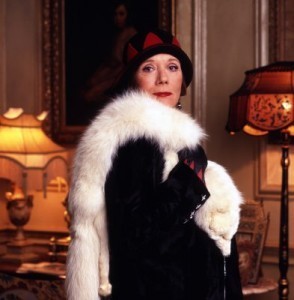 One of the two headline stories of our recent Galactic Suburbia Episode 42 was the piece on Publisher's Weekly about two authors who were upset about an agent asking them to 'straighten' a gay protagonist.
One of the two headline stories of our recent Galactic Suburbia Episode 42 was the piece on Publisher's Weekly about two authors who were upset about an agent asking them to 'straighten' a gay protagonist.
Nicola Griffith shared a video of her describing a similar issue to a group of students, when her own agent questioned why the protagonist of her second novel needed to be a lesbian.
Malinda Lo followed up with a very constructive post looking at the hard stats of YA fiction published in the US over the last several decades. In particular I found it interesting that she proves once and for all that the anecdotal experience of there being less lesbians than gay male characters in YA is absolutely true – in fact, it's a 2-1 balance. So YA authors, time to add the girl on girl kissing!
Finally, it seems that while the Publishers Weekly was carefully not naming and shaming the agent in question, the buzz behind the scenes was not so kind. She speaks out at Colleen Lindsay's blog the Swivet, with her own description of the phone call in question.
[UPDATE] The authors of the original post have replied at Rachel's LJ, standing by their original post and urging people to focus on the bigger and more important picture of making YA more gay-friendly, rather than getting distracted in finger pointing or choosing sides.
In other news, Catherynne Valente provides one of the best responses I've seen to the idea of an Amazon 'subscription service' for e-books. I don't think I know any writer who is more eloquent when angry.
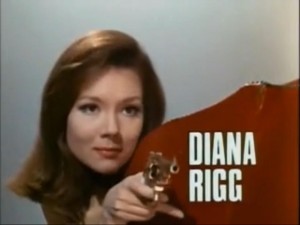 An announcement that the marvellous Diana Rigg is getting her own 'at the BBC' DVD celebration of her TV career.
An announcement that the marvellous Diana Rigg is getting her own 'at the BBC' DVD celebration of her TV career.
Kate Elliott tackles the writing advice question of how to tackle the openings of novels.
a wonderful post by Karen Healey celebrating the women in the David & Leigh Eddings, and how you can appreciate elements of some work while also acknowledging its many, many flaws.
A discussion on why it's deeply inappropriate to use the sexual image of breasts to promote breast cancer awareness – I really appreciate having concrete reasons now to argue against this, as it's something I'd always felt was vaguely wrong without being able to put my finger on why (apart from it always being inappropriate to use the sexual image of breasts to advertise anything).
On Mad Men and the new crop of copycat "retro sexist" TV shows – what's the difference between a well crafted guilty pleasure, and wallowing in the bad habits of the past?
A post on Tor.com about the relationship between the Doctor and children in New Who.
A call for papers for a non fiction anthology about Doctor Who and race.
I love me some My Little Pony rebuilds and these modern Doctor Who monsters are very impressive!
Sketches of Harry Potter kids as hipsters – funny, apart for the repeated joke. My favourite is Draco Malfoy's classic "I hated Potter before it was cool."
Speaking of Potter, I loved the recent entry in Kathleen Jennings 'the Dalek Game' series of sketches, including a discussion of how she came to reading Harry Potter and what it means to her.
Great post for readers wanting to look back at some of the fantasy fiction of the past: a list of the top 10 bad-ass female fantasy characters.
Superboy #1, Static Shock #1, Legion Lost #1, Batwoman #1 [DC Reboot Reviews]
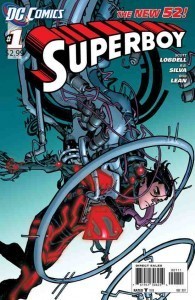 Superboy #1
Superboy #1
Written by: Scott Lobdell
Pencils by: RB Silva
This one was a genuinely pleasant surprise – I picked it up mostly thanks to Wolverina's recent nostalgia fest on the How I Got My Boyfriend Into Comics podcast, because I haven't read Superboy since his original 90′s reboot run. After a series of dull, by the numbers comics from DC this month I was delighted to find a dynamic story with a narrative that genuinely feels modern and fresh, despite starting the character from his origin point.
Who knew? It can be done!
Superboy himself is an intriguing central character considering that he doesn't actually do anything much beyond hang around in his cloning vat for this issue. His voice comes through clearly, though, sardonic and quietly angry, observing the scientists who are making decisions about him, not for him. We also get some cool female characters – 'Red,' the scientist in charge of Superboy's care, two versions of 'Rose,' the sarcastic indie teen girl designed to interest him, as well as the adult she is based on, and even in a few tantalising panels, a very sharp Lois Lane.
There are clever moments throughout the script which kept me very interested, particularly the implications that there is something very wrong with this Superboy when it comes to empathy (and I'm hoping that what is implied about his human donor is true). What's the point of a superhero who doesn't see the point of saving people? I guess we'll find out!
Superboy #1 is shaping up to be a smart piece of YA SF with appropriate but not overwhelming angsty bits, and I'm genuinely excited about where it's going. Hooray! Of course this does mean I'm going to have to pick up Teen Titans, too, but that was probably inevitable.
VERDICT: finally, a comic that doesn't insult my intelligence, and knows how to make set up interesting. I'm on board!
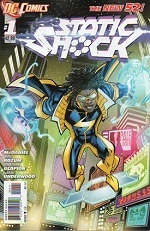 Static Shock
Static Shock
written by: Scott McDaniel & John Rozum
pencils by: Scott McDaniel
This is one from last week's releases that I meant to get, but forgot about. I have to say, it probably suffers for being read straight after Superboy, as it's also a teen boy story, and it's not nearly as tightly scripted.
I like the set up, though, and the hero is bounding with a puppy-like energy as he crackles and pops his way across the city, carelessly leaving all kinds of electro-magnetic carnage around him and spoiling the day of any commuter unlucky enough to be in his path. The family are appealing, too, and the comic is so relentlessly upbeat that it's hard not to like it.
Having said all that – it's a fun comic, but I don't think it's one for me. I wasn't left with any particular burning desire to continue following the characters, so I suspect it's one that's going to fall by the wayside. Still, for those looking for a contemporary boy's own adventure which is reminiscent of 90′s Impulse, this could be the comic for you.
VERDICT: fun but forgettable
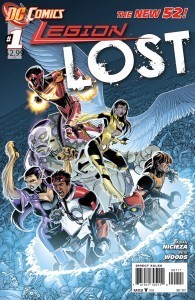 Legion Lost
Legion Lost
written by: Fabian Nicieza
pencils by: Pete Woods
I wanted to like this one. I really did. But it spends the whole issue explaining to me who everyone is and what their powers are and their situation is in the clumsiest way possible, and forgets to make me care about any of them.
Seriously, I get the concept. Heroes from the future, crash into the past, stranded. It's a great concept that's a very easy idea to get across visually. What I don't need is page after page of conversation about characters I don't see and don't know, indispersed with "as you know, X, my power Y complements your power Z to do XYZ" and "oh, K who used to be L, that's a funny reference because M, I'm sorry did you not get it, new reader?"
But do they mention which of the characters are secretly shagging each other? NO THEY DO NOT.
Verdict: a wasted opportunity and one I won't bother with in future.
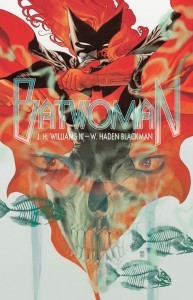 Batwoman:
Batwoman:
written by: J.H. Williams III & Haden Blackman
pencils by: Art by Amy Reeder
This is one I was anticipating greatly, thanks to the buzz around it. I read some of Kate Kane's character in the original 52 when she was launched, and liked her, but sadly crashed with 52 fatigue and never caught up. This is a very good re-introduction to her and her style, without getting bogged down in backstory (do you hear me, Legion Lost?). I like that there's a nod to Renee Montoya and her importance in both Kate's life and that of the Gotham Police Department, but no complicated explanations.
Also, you know what's awesome about having a lesbian superhero? The book is FULL OF WOMEN. Her love interest/police contact, her youthful apprentice and her approaching antagonist are all female. The only men in the book, Kate's father and Batman, both have very brief appearances in which they say little compared to what she has to say. While that's a standard thing for Batman, I thought the conversation between Kate and her father was particularly interesting because it was so much about her angry words, and not his own version of events. Also of course a convenient way to get a bit of backstory in, but at least it was tied to a nice big chunk of emotion.
The art is gorgeous – a bit more arty and spiky than the clean lines I generally prefer, but the use of colour is very powerful, especially the reds of Batwoman's costume – and I love the fact that Kate puts on a longer wig for Batwoman, but it's the same colour as her natural hair. I was a little freaked out about daytime Kate's colouring – really, isn't there a law about a character in Gotham City having unnaturally white skin unless they're connected to the Joker or Harley Quinn in some way? It was extremely distracting.
(I didn't realise until tidying this post to publish it that the art of this book is by a woman – currently the only female artist working the DC universe, I think? Also I think notable that Amy Reeder is credited for 'art' as a whole – rather than having the pencils and colour separate, the colour did feel more integrated in the artwork before I knew that. Hmmm, interesting)
Bette was an interesting character – I've read comics with the original Kathy Kane & Bette as Batwoman and Batgirl (aka Batman and Robin's girlfriends) but didn't realise Bette was part of Kate Kane's universe. I love that she looks exactly the same as she used to, in a 1960′s pin up kind of way, and the scenes that show Kate trying to train her seriously. I do like a 'tough older female, annoyingly peppy younger female' training dynamic, so that's fun.
Anyway, a very good comic, among the best I've read as part of this experiment. Onwards and upwards!
Verdict: So far so good!
Note: as with last week, I accidentally overlooked a title that I had intended to buy – in this case Demon Knights which, like Stormwatch, is written by Paul Cornell. Rather than let myself descend into dangerous impulse buying, I'll do like I did with Static Shock and hold that one over to next week. I'd love to hear from people about their DC comics haul, whether they're reading them in paper or e-version, and what they're looking forward to or dreading in the New 52 to come.
Galactic Suburbia Episode 42
 New episode up! Grab it from iTunes, by direct download or stream it on the site.
New episode up! Grab it from iTunes, by direct download or stream it on the site.
In which we discuss Orson Scott Card's Hamlet, the agent who said no way to gay YA, Tansy's Blake's 7 dolls, the superhero who fights with her hair, and Alisa works through her issues with Doctor Who.
COME ON IN, EPISODE 42 IS FINE
News
Subterranean Press address email complaints about Hamlet's Father by Orson Scott Card
And Rain Taxi review that started it
The other big Internet Thing – agent says no gay in YA dystopia please & authors speak out
New podcast – Live and Sassy
Twelfth Planet Press opening for novel submissions
What Culture Have we Consumed?
Alex: Retribution Falls, Chris Wooding; Blake's 7; Hyperion, Dan Simmons.
Tansy: Torchwood (non spoilery), Justice League comics (the new 52), The Business of Death by Trent Jamieson
Alisa: Podcasts: Locus Roundtable (Gail Carriger and Francesca Myman; Kathleen Goonan, Eileen Gunn and Gary K Wolfe); Eurocon 2011 Gender in SF&F Panel; The Outer Alliance Podcast Episode 11, Season 3 Doctor Who
[Book calling for papers on the topic of race and Doctor Who]
Please send feedback to us at galacticsuburbia@gmail.com, follow us on Twitter at @galacticsuburbs, check out Galactic Suburbia Podcast on Facebook and don't forget to leave a review on iTunes if you love us!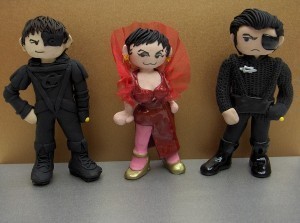
Servalan and her two best men
September 14, 2011
Because Gwyneth Jones is awesome
Last night, while we were recording the latest episode of Galactic Suburbia (don't panic, it's not up yet), Alisa sent me into a 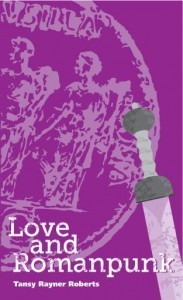 silent, hand flapping freak out by forwarding a link to a post by feminist SF legend Gwyneth Jones who has read and reviewed several of the Twelve Planets books. Including, you know, MINE.
silent, hand flapping freak out by forwarding a link to a post by feminist SF legend Gwyneth Jones who has read and reviewed several of the Twelve Planets books. Including, you know, MINE.
It's a very cruel thing to do to a friend while there's a live microphone, and I think I did very well to keep my head from exploding all over the keyboard.
The full post is here, but I'd like to quote my favourite parts:
"These collections, just four stories in a slim paperback, are an excellent idea, a tasting menu of Australasian female genre writers. Romanpunk has an intriguing twist on the noble vampire and mortal girlfriend* story (see, these vampires are really Lamia, they're Roman in origin, and very well connected, but they find the C21 street has its uses). Ever wondered why pretty-boy Caligula was such an unmitigated horror in private life? Or why Nero was finally forced to kill his mother? Refreshingly, unlike Buffy, the mortal girlfriend is not allergic to education and actually has a life… "
and…
"These Australians give me hope for the future of female, and even feminist, writers in sf."
Gwyneth Jones is one of my heroes, so it's hard enough to wrap my head around her having read my book, let alone saying lovely things about it, and the series as a whole. (she also had some cool things to say about Sue's book, and Lucy's)
A reminder that I'm going to be reading from Love & Romanpunk at the Republic Bar (North Hobart) on Sunday 2nd October from 3pm (I think I'm first up so come early if you want to see me), and will have a few copies of the book there if you haven't sourced yours yet. No bookings required. If you'd like me to bring along a copy of Siren Beat for you to buy from me, let me know.
You can of course buy a copy direct from the publisher, as well as other books in the Twelve Planets series.
Watching New Who: Bad Wolf/The Parting of the Ways
 Watching New Who – in conversation with David McDonald, Tansy Rayner Roberts and Tehani Wessely
Watching New Who – in conversation with David McDonald, Tansy Rayner Roberts and Tehani Wessely
David is coming to New Who for the first time, having loved Classic Who as a kid. Tehani is a recent convert, and ploughed through Seasons 1 to 6 (so far) in just a few weeks after becoming addicted thanks to Matt Smith – she's rewatching to keep up with David! Tansy is the expert in the team, with a history in Doctor Who fandom that goes WAY back, and a passion for Doctor Who that inspires us all (plus a six-year-old daughter who is finding her own Doctors for the first time). We're going to work our way through New Who, using season openers and closers, and Hugo shortlisted episodes, as our blogging points. Just for fun! We have already talked about:
"Rose", S01E01
"Dalek", S01E06
"Father's Day, S01E08
"The Empty Child/The Doctor Dances", S01E09/10
BAD WOLF/THE PARTING OF THE WAYS – Season one, episodes twelve and thirteen
The Doctor – Christopher Eccleston
Rose Tyler – Billie Piper
Captain Jack Harkness – John Barrowman
TEHANI:
These reviews have come thick and fast for the second half of the season, thanks to the way the Hugo voters nominated, and there's only one episode between our last chat about "The Empty Child/ The Doctor Dances" and this one. "Boom Town" was another Slitheen episode, featuring Jack and Mickey and some interesting conversations, but not much else?
TANSY:
"Boom Town" is one I disliked originally and slowly came to love. It pulls the season together as a whole I think and provides lots of lovely character stuff, but there's not a whole lot to talk about. Moving on – "Bad Wolf" and "The Parting of the Ways"!
DAVID:
Wow, certainly lots to talk about after the series finale! We have the lot – Daleks, the Time Vortex, the wrapping up of the Bad Wolf arc and, of course, a regeneration!
I found the first episode a bit underwhelming to start with.
TEHANI:
I agree. The dislocation at the beginning was great, but overall, the tone of "Bad Wolf" was very different to that of "Parting of the Ways", and I'm not sure it entirely worked for me as a two-parter.
DAVID:
I suspect at the time it might have seemed a bit more topical, but it is a little dated now. Obviously, a certain degree of suspension of disbelief is always required when watching a show like Doctor Who, but I think that they would have been much better served by putting it in about the year 2300 and saying that culture was going through a nostalgia phase rather than entertaining the idea that in the year 200,000 people were still speaking in English accents. It's a bit like how 80′s sci fi movies always show people in the future dressing in glammed up '80s fashion, it's not a very ambitious treatment of where humanity might be so far into the future. However, I did like the concept (which was very Running Man) of the various game shows, I don't think that I am alone in having a vague suspicion that one day reality shows may have a fatal element!
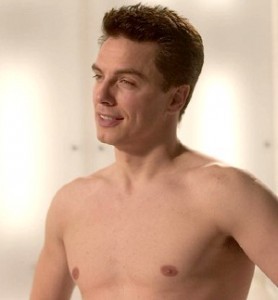 TANSY:
TANSY:
I think "Bad Wolf" – or at least the reality show bits – are the only part of this season where the cultural references don't entirely translate from British to Australian. We had Big Brother, of course, and the Weakest Link, but not with those particular hosts. I don't entirely feel it's dated but that's mostly I always found a slight disconnect with the obvious TV tie-ins from a different country. Having said that, I really enjoy this episode – especially the way they appear in the odd situation without the transition from the TARDIS scene, and the whole concept of adding death stakes to reality TV – hardly a new idea, but this was before The Hunger Games went viral!
TEHANI:
Even thought I thought it was a bit silly (and it seemed a very convoluted set up to the pay off in the second part), I loved the way the Doctor behaved in the Big Brother house – it was like he was channelling one of those contestants we love to hate, with the flouncing and the lounging and the rule-breaking… And Jack with his "Ladies, your ratings just went up."
TANSY:
I like the outright comedy because of the sting that follows it, where their jolly romp turns deadly. Also, Eccleston and Barrowman are so much fun to watch when they are enjoying themselves, and you feel the energy crackle in those early scenes!
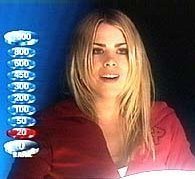 DAVID:
DAVID:
There were lots of fun little bits, especially Captain Jack and his make over, but compared to the second episode it was a bit lightweight. One thing I thought was done quite well, though, was Rose's initial reaction of not taking the show seriously, and her dawning horror at the realisation of the stakes. And, while I didn't think for a moment believe that she was actually killed, the impact her apparent death had on the Doctor and on Jack spoke volumes for the relationships that had developed over the season. Then, things started to get really exciting with the reveal of the Daleks and the Doctor's awesome little speech, all of which set us up for a wonderful finale in the second episode…
TEHANI:
Tansy, on the first time viewing, did you KNOW Rose wouldn't be dead? After all, we've just met Lynda with a "y", who has already invited herself along with the Doctor – kill off one blonde, replace her with a ditzy(er) one? The reactions of the Doctor and Jack here were pretty believable – Jack went all macho and the Doctor stone cold – it *could* have been real?
TANSY:
I'm trying to remember – I don't think I believed she was dead like I did believe Jack was going to die back in "The Doctor Dances", and I can't for the life of me remember if that's because I had been spoiled by anything (ahh the days before Twitter, the blissful easy-to-avoid-spoiler days).
I've said before how much I like the TARDIS team of Nine-Rose-Jack, and I think this two parter shows them off to great effect. The emotional reactions by both men to her "death", and the later scene when Jack figures out she's not dead, really resonated with me. Despite all the threeway flirting, the overall sense I get here is that they are all very good friends who care a lot about each other, and I liked that emotional dimension.
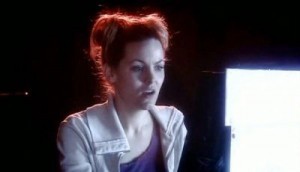 I do think I was a bit alarmed by the obvious grooming of Lynda with a "y." Sweet and all, but not overly interesting. I definitely knew by that stage who the next Doctor was going to be, so it is likely I knew Billie Piper was sticking around. So … did anyone else think Lynda was going to be the new companion?
I do think I was a bit alarmed by the obvious grooming of Lynda with a "y." Sweet and all, but not overly interesting. I definitely knew by that stage who the next Doctor was going to be, so it is likely I knew Billie Piper was sticking around. So … did anyone else think Lynda was going to be the new companion?
TEHANI:
I guess I knew Rose was still there in Season 2, but even then, I was really hoping Lynda wouldn't be! She grew on me in the second part though.
DAVID:
I had her pegged as a casualty, I'm afraid. Which was sad, as she was rather sweet. Speaking of casualties, talk about a body count!
TEHANI:
Yeah, we got to know quite a few people only to have them killed off!
TANSY:
One of RTD's best qualities as a writer is his ability to convey character in one or two lines, and he uses that to devastating effect here as a whole bunch of perfectly nice people get slaughtered.
DAVID:
I loved the portrayal of the Daleks in this episode, even more so than in "Dalek". For one thing, the visuals of swarms of Daleks were extremely powerful, and gave a sense of there being a lot at stake and there being terrible consequences if the Doctor failed. They were ruthless, and it built on the good work of "Dalek" in presenting them as terrible killing machines, rather than just a joke.
TANSY:
It's easy to forget now how impossible it seemed back then, the idea of Doctor Who coming back and being good, being equal to American science fiction shows in terms of special effects and how it looks on screen. Now, I don't really give a damn about special effects as it's all about the character and dialogue for me (and New Who delivers that in spades) but throughout this season and this final two parter in particular, it's astounding to see how good they were able to make the huge imaginary universe of Doctor Who. Getting to see Daleks in a literal swarm, to see the deadly force rather than just being told to be scared while looking at blips on a screen or the same 4 Dalek suits … that was huge. Daleks hadn't looked this effective outside comic books before.
TEHANI:
The Daleks are still the scariest monsters to me – I think it's the voices. Freaked me out as a kids, and still has that power!
DAVID:
The whole idea of the Dalek Emperor driven insane by the fallout of the Time War was very clever, especially given the way the Doctor's emotional damage has manifested throughout the season, and I LOVED the concept of a race obsessed with genetic purity and racial supremacy being unable to deal with the measures they were forced to take to survive, and being driven to a religious mania in response. The degree of self loathing would have been incredible!
TEHANI:
I was thinking of Alisa throughout that whole bit though and imagining how triggering something like that could be to people who have cultural history with genocide and genetic purity – which makes it all the more frightening because it's far too close to our real historical home.
TANSY:
Yes, speaking as someone who knew what a Dalek was long before I knew what a Nazi was, I find it very hard to make that real life/historical connection, and I've only learned quite belatedly as an adult that what the show has treated like a clever metaphor since 1963 actually can have deep real-life psychological resonance.
Getting back to the Dalek Emperor, I remain deeply uninterested in him as a villain – he works fine here as a head Dalek or whatever but I don't really get excited about individual Daleks except maybe in the Peter Cushing movies where they had a lot more personality. I associate his part in this story with a deep sense of disappointment because at the time there was this huge 'NEXT WEEK' teaser about who could possibly be the big bad, and to be frank, I was hoping it was Adam.
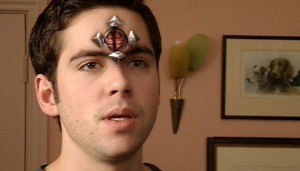 We sort of skipped over Adam in our reviews, the boy genius who joined the TARDIS crew back in Dalek and was forcibly ejected the following week thanks to Not Being A Good Companion. I really wanted the Doctor to have some consequence for leaving a kid with a head full of alien tech back on Earth, and the idea that he might have grown up to be some kind of Dalek ruler was one of many theories flung around in that week before the finale reveal. Sigh. It would have been awesome.
We sort of skipped over Adam in our reviews, the boy genius who joined the TARDIS crew back in Dalek and was forcibly ejected the following week thanks to Not Being A Good Companion. I really wanted the Doctor to have some consequence for leaving a kid with a head full of alien tech back on Earth, and the idea that he might have grown up to be some kind of Dalek ruler was one of many theories flung around in that week before the finale reveal. Sigh. It would have been awesome.
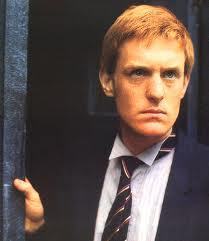 DAVID:
DAVID:
I did find the Adam thing a little odd, it really shows how different this Doctor is. I'm not sure what you think of the comparison to Turlough, who was guilty of a far more serious transgression and yet got a chance at redemption, but the Doctor didn't even think twice about sending him back. Perhaps that was because he was a rival for Rose's attention! But, yes, sending him back with a head full of anachronistic technology (literally) seemed a bit irresponsible, and I wouldn't have been surprised to see consequences from that. I didn't even link him and the Dalek Emperor, though, my first thought was Davros.
TANSY:
Well, this is a different and less forgiving Doctor! I enjoyed Adam actually, I thought the actor did a great job at portraying a character who is all too human. Two episodes was about enough of him, though. Turlough's one of my favourites, possibly because he was one of the few companions in the old days who got something of a story arc. But then I tend to like characters who have a bit of moral ambiguity going for them.
TEHANI:
There's a few things about the ending that bugged me, but more from an approach of knowing what comes down the track, so I'll save that discussion for the end of Season Four, shall I?
We get a fair bit of Mickey and Jackie in the final episode. Mickey impressed me here – he's slowly coming to terms with the fact that Rose just isn't that into him, and even when she's casually hurting him, completely oblivious to anyone's feelings but her own, he still supports her and helps her in any way he can. Jackie too, understanding that Rose has bigger things in her life and just can't settle back to how things were, shows herself as a good mum, even though she wants nothing more than to have Rose stay.
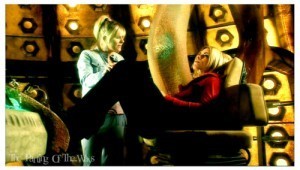 TANSY:
TANSY:
I was disappointed that after giving Mickey some great progression in the "Aliens of London" story, he was back to whining and being needy in "Boom Town". But I love him in this story, the way that he accepts that Rose has to be with the Doctor, and helps her. Jackie and the yellow truck and the way the two of them support Rose when it would be so much easier for them to let her grieve and move on is a fabulous end of season pay off for both their characters. (I've enclosed a favourite old YouTube vid featuring that truck at the end of this post) Also worth noting here that this is the closest Rose actually comes to formally breaking up with Mickey. He got a lot of stick for being clingy or whiny about Rose at the time this first screened, and probably since – he's certainly one of the least beloved of all the companions of this era (accepting that most people forget about Adam) and yet she did something quite terrible to him in that she never broke up with him, never officially told him it was over.
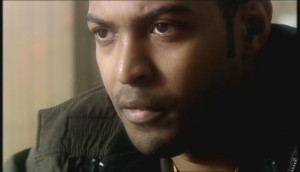 DAVID:
DAVID:
He is the archetypal "nice guy". isn't he? Of course, it's good that they didn't go the easy, Hollywood way and let him get the girl in the end. What I really liked was that, while both Jackie and Mickey get portrayed as fairly shallow and self centred at times, when it really mattered they did the right thing at the expense of their own desires and put Rose first. That, to me, sums up how much they truly care.
TANSY:
Mickey's decision that he's not actually cut out to be a companion is a very cool and honest one. I like very much where the story takes him, and this one is the beginning of him becoming braver and more central to the action. Hooray for Mickey!
TEHANI
I think there's some foreshadowing here of what's to come later, with the exploration of what it means to be a companion to the Doctor, and what it means when you no longer are. But more of that in future eps!
And then we get to the end. No more Nine, *sniff*. Tansy, I'd love to hear your thoughts on the final scene with Rose and Nine.
TANSY:
I think that the whole final section of the story in which the Daleks are basically – well, they could be any monster, it doesn't matter, all that's important is that death is coming – we see some great stuff from both Nine and Rose. His choice to trick her into the TARDIS and get rid of her is fabulous. That moment where he's all energetic and doing his 'yes I can just save the day if I bzzzt-ching' act, and then the second she's safe, he just stops pretending, is amazing. I love that he follows through on his promise to Jackie, and that Jackie actually appreciates it.
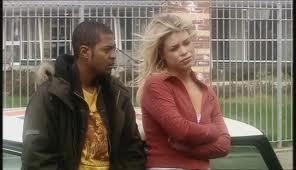 Rose's journey back, quite apart from the fabulous contribution from her Mum and Mickey, is likewise wonderful. Condemned to return to ordinary life and let the TARDIS fall into quiet hibernation, she decides no, screw it, I'm going to do something else. So she rips the TARDIS apart to get back to the Doctor. Hugely symbolic, and shows that she is after all a worthy companion, not just someone along for the ride. I also love how the Bad Wolf revelation is shown through the graffiti, very effective.
Rose's journey back, quite apart from the fabulous contribution from her Mum and Mickey, is likewise wonderful. Condemned to return to ordinary life and let the TARDIS fall into quiet hibernation, she decides no, screw it, I'm going to do something else. So she rips the TARDIS apart to get back to the Doctor. Hugely symbolic, and shows that she is after all a worthy companion, not just someone along for the ride. I also love how the Bad Wolf revelation is shown through the graffiti, very effective.
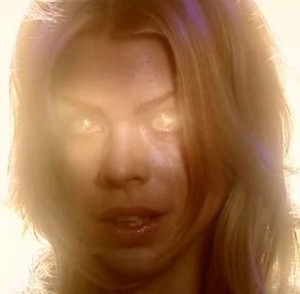 But the final FINAL scene, oh yes. I adore it. I don't care that the Daleks are literally handwavied away – have I mentioned that really the Daleks themselves aren't intrinsically interesting? – and I think seeing Rose Tyler become effectively a Time Goddess is hugely powerful. Even better is that you can't do that sort of thing without consequences, and both Rose and the Doctor pay big time. Well, mostly the Doctor.
But the final FINAL scene, oh yes. I adore it. I don't care that the Daleks are literally handwavied away – have I mentioned that really the Daleks themselves aren't intrinsically interesting? – and I think seeing Rose Tyler become effectively a Time Goddess is hugely powerful. Even better is that you can't do that sort of thing without consequences, and both Rose and the Doctor pay big time. Well, mostly the Doctor.
(heh and in a not-to-spoil David aside, Tehani, I have to say I had a whole different view on this scene after "The Doctor's Wife" in season 6)
TEHANI:
Yes!! I was thinking that too, second time around!
DAVID:
Rightly or wrongly, I've judged Nine against the Doctors I grew up with, and I thought the Doctor sending Rose away was very true to the earlier incarnations. It was a lovely moment that said a lot about his character and sense of responsibility.
TANSY:
I don't think you can NOT judge him against the other Doctors – I'll bet even Tehani did that, thanks to watching New Who in the wrong order!
TEHANI:
It's true. But I'm kind of glad I did fall for Eleven first, because I'm not sure I would have loved Nine in quite the same way otherwise. That's a bit weird maybe, but Matt Smith helped me enjoy the two who came before! I've no idea why.
DAVID
If Rose had simply restored everything, brought everyone back to life and all that, I would have seen it as a massive cop out. But, I found the idea of Rose possessed by the Vortex an extremely potent image, and I liked that there was a price that had to be paid. I think it says a lot about her development that in the end it is Rose's choices and actions that save the day, she is not just a passive spectator.
TEHANI:
This is a really good point – she took things into her own hands and refused to be a damsel who got rescued and sent away. I really liked her in this episode for that.
DAVID:
The idea of Rose seeding time and space with clues was brilliant, and it was a great way to resolve the "Bad Wolf" arc. I have to say I was very satisfied with the finale and how the writers brought the season to an end.
The Daleks not interesting? lol I'm afraid I have to disagree, vehemently.
TANSY:
When it comes to Daleks … okay, interesting, yes, they're not boring as such. If you're going to have a huge army of robots pursuing the Doctor and his friends I'd prefer it to be the Daleks (or, you know, those Other Ones) because of the baggage they bring to the story. But I don't feel the need for the Daleks to be anything other than a reason for the characters to be terribly afraid, and do interesting things in response. The Daleks are mostly interesting to me because of the way the Doctor responds to them, rather than in and of themselves.
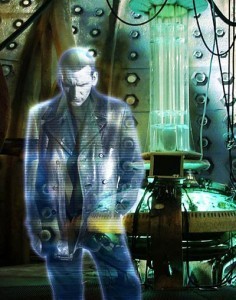 TEHANI:
TEHANI:
This Doctor has a really visceral reaction to them. Is it because the Time War was relatively recent for him? Let me get this straight though – the Time War is something that hasn't actually been shown in the show? It's something that we're only seeing the aftermath of?
DAVID:
As far as I am aware, the Time War is a new concept. I can't remember it from Classic Who, though I may be wrong.
TANSY:
The Time War is definitely something that was created for this season as a backstory buffer between Classic and New Who. It is alluded to many times but we only find out details as we go, and it's something that works incredibly well because it allows the Doctor's very complex backstory to be explained with a minimum of words and maximum emotion. Most of what happened before is irrelevant because the Time War pretty much trumps everything else. Gratuitous Unnecessary Backstory Detail is one of the major crimes committed by the TV movie which I'm pretty sure RTD analysed and used as a manual on How Not To Bring Back Doctor Who. Except for the bits to do with kissing.
TEHANI:
That TV movie is one you're going to make me watch, I just know it! Okay, this is good to know – it *feels* very honest, like it belongs to Doctor Who as a whole, so I'm terribly impressed with the fact it's unique to New Who. Kudos RTD!
DAVID:
I haven't seen it either, the impression I got was that it was to be avoided! But, I am sure we will have to go back and cover it … just to be thorough 
I agree about the Time War, the have done an excellent job of weaving it into the mythos so far, and I am really looking forward to seeing how it plays out, and desperately trying to avoid spoilers.
TANSY:
The TV Movie is totally worth watching, and the Doctor in it is marvellous, but apart from him it is totally a lesson in what NOT to do. I am really looking forward to watching it with the commentary by Paul McGann and Sylvester McCoy together… but yes, that's for another day.
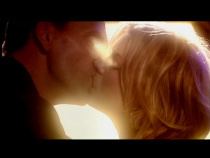 Let's get back to the romancey parts, as Raeli would say! It was the kiss that was heard across the world of fandom – though none of the old school fans railed as loudly as they did back in 1996, so thank Eight for taking all the flak about Doctor snoggage – and I have to say that much like snow in a Christmas episode, kisses in this era of Doctor Who are mostly fake-outs rather than actual kisses. As in, we have a pretendy plot reason why they are kissing, but we're going to totally put it in the previews so people think the Doctor randomly goes around snogging girls, hahaha! (having said that, while there is regular complaint about the Doctor and all that girlkissing, I'm not sure if there was any reaction at all to the fact that he and Jack also share a kiss in this episode, and one that has nothing to do with the vortex).
Let's get back to the romancey parts, as Raeli would say! It was the kiss that was heard across the world of fandom – though none of the old school fans railed as loudly as they did back in 1996, so thank Eight for taking all the flak about Doctor snoggage – and I have to say that much like snow in a Christmas episode, kisses in this era of Doctor Who are mostly fake-outs rather than actual kisses. As in, we have a pretendy plot reason why they are kissing, but we're going to totally put it in the previews so people think the Doctor randomly goes around snogging girls, hahaha! (having said that, while there is regular complaint about the Doctor and all that girlkissing, I'm not sure if there was any reaction at all to the fact that he and Jack also share a kiss in this episode, and one that has nothing to do with the vortex).
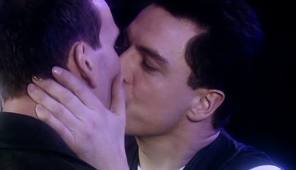 TEHANI:
TEHANI:
Heh, my eight year old reacted to it though! "Mum, the Doctor kissed another boy!" Very cool.
TANSY: Raeli just laughed hysterically. I like to see it as normalising the idea of same sex relationships, or something. She hid and went 'ew' when the Doctor kissed Rose. Speaking of which, the Doctor must have been able to remove the time energy from Rose by a good firm handshake if he really wanted to, and the slightly cheesy, 'You need a Doctor,' line does rather suggest he's been Thinking A Lot About Kissing Her Actually. So I'd say it's one of the rare real kisses in RTD's Who rather than a Pretendy Fakeout Kiss, myself.
DAVID:
The Doctor/Jack kiss was rather passionless, though, like a European greeting. It didn't really register for me as anything more than that. I thought him kissing Rose was well within character as presented through the season, the opportunity presented itself so he took it! After all, he was about to do something that might very well kill him.
TANSY:
I think the goodbye kiss meant more to Jack than it did to the Doctor, personally! What I like about it really is that he treats them equally – they're both his dear friends, both people he fancies a bit, and he kisses them both goodbye. I also like the fact that the Doctor takes the kiss politely – not making a big deal out of it. But, you know. First same sex kiss on Doctor Who. A lovely precedent as well as being something that tells us more about character.
TEHANI:
I love that it's just something that happens, no big fuss. It makes me feel like we really can be accepting of all sorts of relationships in our society, and Doctor Who is, to me, doing a really good job of making such things normal.
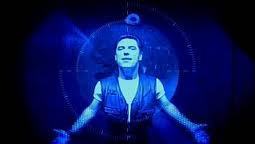 TANSY:
TANSY:
Jack, of course, trots off to his heroic death by Dalek. Which, ONCE AGAIN, I assumed at the time was going to be his, you know, actual death. But – and as Tehani can understand, this is going to be hard to discuss without massively spoiling David for future seasons, so I will tread carefully – he is brought back to life thanks to Rose and the Time Vortex. After which, the Doctor picks up Rose, takes her into the TARDIS and FREAKING FLIES AWAY, leaving Jack in a pretty appalling situation. I was furious about this at the time, and it took the show so VERY LONG to resolve it in any way. OK, I didn't have to wait as long as Jack, but it still really upset me to see them ditch him. I do think it suggests that both the production team and the Doctor himself are a hell of a lot more cavalier when it comes to the male companions than the female, and it is something that still makes me cranky even when the show (and to some extent the Doctor) acknowledges this fault.
TEHANI:
But they didn't KNOW he was alive again, did they? My kids were most distressed about it when they watched it: "They left him behind!" But the Doctor knew he'd died, and Rose didn't remember bringing him back to life, did she?
TANSY:
(and for further discussion on this topic please make sure you watch the Children In Need special scene before The Christmas Invasion!)
TEHANI:
Ooh, didn't know about that! *goes to watch* [http://www.youtube.com/watch?v=IZK8tP...] Hmm. You know, that works for "The Christmas Invasion" but not so much for the end of "The Parting of the Ways". Darn.
TANSY:
Most importantly, THE DOCTOR TOTALLY KNEW JACK WAS ALIVE. Which is also confirmed much, much later. It could have been a clever lie, so as to shield Rose from Jack's death, but a) that would be appalling and infantalising of her and b) he totally knew.
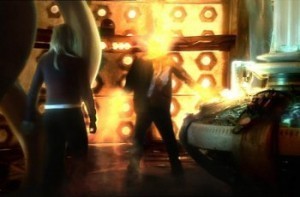 DAVID:
DAVID:
I am afraid that Jack's death is another moment where I didn't feel the full impact, which I guess is some sort of punishment for waiting this long to watch the series! I was confident Jack was only mostly dead, as Miracle Max might say, and that something would happen to bring him back. As for the Doctor leaving him behind, I have to admit that I was so caught up in the regeneration and what had just happened with Rose that I didn't really think to much about that, but now that you mention it, it does seem a little rough. The Doctor is always a little flaky after a regeneration, though.
TEHANI:
Hee! You are such a nerd, giving us a Princess Bride reference! So this was my first regeneration, and I can't wait to talk about the end of Tennant's reign in comparison.
DAVID:
Maybe this is covered later (and I have to thank you both for being so considerate about spoilers, btw), but I wish they had given a reason for Rose not bringing some of the others back to life, especially poor Lynda-with-a-y. I am glad that she didn't, as I would have probably seen that as minimising the impact of the episode and a bit too much hand-waving, but a nod to the fact might have been good.
Oh, and I prefer the term "geek" 
TEHANI:
I don't know. I was glad Jack didn't stay dead, but it didn't bother me that the others didn't. When I say it didn't bother me, it was more that it MEANT something for them to be dead – it made it more powerful I think, and reminds us that sometimes people do die. Although yes, some dwelling upon this fact would also have helped. Maybe the Doctor's sadness before Rose returned was the nod?
TANSY:
The Dalek video!
Embed:
TEHANI:
Tansy, that is terrible! It does somewhat take away the scare factor… 
DAVID:
That is wrong on so many levels! Just a warning to our readers, turn down your speakers *before* you click that link. I jumped about three feet and I am not very popular with the person it woke up. It didn't help that I was laughing hysterically, either!
TANSY:
The internet is a wonderful place, this is all I am saying.
Detective Comics #1, Action Comics #1, Hawk & Dove #1 [DC Reboot Reviews]
Yeah so I think I need to learn from this week that reading the half of your comics haul that you're most excited about first is not necessarily a good thing.
Or maybe I learned that I need to only buy the comics I actually care two pins about.
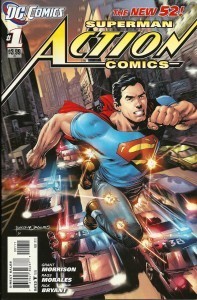 Action Comics #1
Action Comics #1
written by: Grant Morrison
pencils by: Rags Morales
Man this was a dull comic. Possibly one of the dullest Superman comics I've ever read. In the end I was reduced to counting women (one elderly but surprisingly chatty landlady and a belated appearance by Lois Lane) and saying, really? A train speeding out of control? Is that what the cool kids are putting in comics now? Because I'm pretty sure it was done better in Spiderman II…
This is the trouble with cutting away all the baggage and history of current characters, but not actually doing anything new with them. Superman in blue jeans is less interesting than when Cassie in Tiny Titans chose jeans instead of a traditional costume. Yes, I am comparing this comic to Tiny Titans, because that is what I read to cheer myself up afterwards!
A Superman with the weight of all his past choices behind him and a steady marriage to Lois is a hell of a lot more interesting to me than some young buck. Sure, they are blatantly setting the romance up again, and I did quite like her attitude as far as choosing to hate Jimmy's friend Clark without ever having met him, but we have been there done that, there are t-shirts of this. Origin stories are dull the second time around. We've had this one a few times now, especially if you take movies into account. I don't care what i09 says, Lois and Clark did it better.
Verdict: unlikely to pick this one up again unless they bring back Maxima. You heard me.
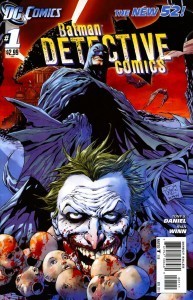 Detective Comics #1
Detective Comics #1
script & pencils by: Tony Daniel
Man, this was a depressing comic. The art was grotesque (I bought it cos interested what the baseline for new Batman was, if I'd actually looked closely at the cover, it would have turned me off every bit as much as the cover for Animal Man did) and the story felt very much like a by-the-numbers Batman v. Joker with no contemporary spark to make a reboot at this time seem remotely worthwhile.
Basically this comic was humourless and violent, and made me feel a lot kinder towards both Justice League and JLI for portraying Batmans that are far more to my taste. I'm a fan of if an intermittent visitor to the Batverse and it seems pretty clear that this particular portal is not for me.
As with the Action Comics issue, I picked this one to help get a sense of what this rebooted universe is like, and got nothing at all from it – no sign of where Batman is in his personal timeline, how many Robins he has run through, and even the girl he's supposedly treating badly this week doesn't have a cool name.
Verdict: Bah and also, meh. Not one I'll be picking up again in a hurry.
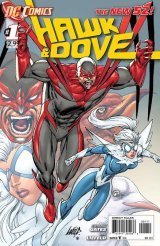 Hawk and Dove #1
Hawk and Dove #1
Written by: Sterling Gates
Pencils by: Rob Liefeld
There's nothing incredibly exciting about this comic, but I have to say after the other two crushing disappointments in this batch, it was a breath of fresh air. For a start, it's an actual Issue #1, introducing the characters, which bits of their backstory are most relevant, and some internal as well as external conflict. Really, is this so hard to do, other comics people?
The art appeals to me but that may be because it has a good old fashioned (in a cheesy 90′s way) sensibility. I love that both the male and female characters are given equal time. The Hank and Dawn pairing is my favourite Hawk and Dove combo (poor old Don really is more interesting dead) and having discovered their comic and got addicted just before the Monarch storyline ripped them to bits way back when, it's nice to see them get another chance.
Verdict: depends on the competition of other titles, but I'm likely to stick with this one for a bit.
September 11, 2011
Pratchett's Women: Slash! Stab! A Lesson in Practical Queening.
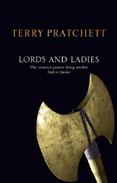 Lords and Ladies, by Terry Pratchett, is the best kind of fantasy novel.
Lords and Ladies, by Terry Pratchett, is the best kind of fantasy novel.
For me, the best possible thing that fantasy as a genre can do is to say something important about our world and history, ideally while also commenting in some way on the traditions of the genre itself, and being a damn good read. Add to that a whole bunch of female characters who happen to be the central drivers of the plot and…
Oh, yes. Lords and Ladies is that good.
In some ways, this book is the last third of an unofficial trilogy (with Wyrd Sisters and Witches Abroad) featuring the original trio of Pratchett's witches: Granny Weatherwax, Nanny Ogg and Magrat Garlick. In other ways, it's the beginning of an unofficial trilogy (with Maskerade and Carpe Jugulum) about the mortality and power of Granny Weatherwax, with bonus Nanny Ogg at every turn (she doesn't just steal scenes, she gets them drunk and makes them blush with dirty jokes) and the growing pains of Agnes "Perdita" Nitt.
But this is also, like so many of Pratchett's best books, a book about stories. In this case, having taken on Shakespeare and fairy tales, he looks at the role of women in English folk songs and folklore. This is a story about cold iron and fairy glamour; of midsummer rituals and blood in the snow and dodgy jokes about morris dancers and maypoles. It's a story about how practicality trumps romance every time, if you're lucky.
Most of all, while it has much to say about witches and wives and mothers, this is a story about queens.
[MANY MANY MANY SPOILERS]
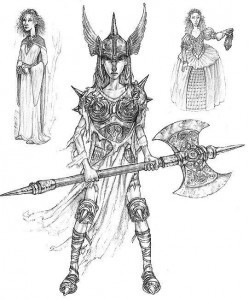 I love the progression of Magrat in this story, from finding herself in the unexpected position of being engaged to a king, to awkwardly tiptoeing around and through the question of what, exactly a queen is supposed to do all day. There are pointed comments about the double standard, how Verence can basically trot around with his arse out of his trousers, acting only slightly more regally than in his life before, and he automatically gets respect – but when it comes to queens, there are fashion requirements, and an odd juxtaposition between high status, and official uselessness.
I love the progression of Magrat in this story, from finding herself in the unexpected position of being engaged to a king, to awkwardly tiptoeing around and through the question of what, exactly a queen is supposed to do all day. There are pointed comments about the double standard, how Verence can basically trot around with his arse out of his trousers, acting only slightly more regally than in his life before, and he automatically gets respect – but when it comes to queens, there are fashion requirements, and an odd juxtaposition between high status, and official uselessness.
Scenes where Magrat and her hapless ladies maid try to figure out the ridiculous clothes, her attitude to embroidery, and so on, are both funny and poignant. The worst of it, of course, is Magrat feeling that she has to leave all of her old life as a witch and healer behind, ridding herself of all the magical paraphenalia she had surrounded her with before. She literally steps out of one identity and into another, and understandably, it does her head in. Pratchett is excellent at pointing out how so many story tropes are actually ridiculous if you try to fit realistically ordinary people into them, and there is so much commentary here not only on the traditional portrayal of queens in mythology, history and literature, but also on the shifting nature of women's identity when they marry.
The climax of Magrat's personal journey is her discovery of Queen Ynci, the kind of queen no one had told her about, a warrior queen with spiky armour – and also her encounter with the royal beekeeper, who tells her the most fascinating details about the queens of that species. When the chips are down and her royal husband is in danger, Magrat emulates both Queen Ynci and the queens of beekind, becoming a true Slash! Stab! kickarse heroine. But the Pratchett 'realism' is still there, pointing out in the quiet mutters of other characters that acting like a character out of a folk song is a good way to get yourself killed, and holding a sword doesn't mean you can use it. Luckily, Magrat isn't just inspired, she's also clever.
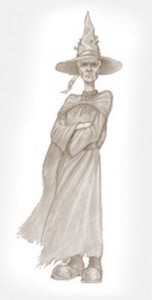 Part of the reason this story is so uplifting is because there's also a very frustrating narrative line whereby Granny Weatherwax and Nanny Ogg are trying to deal with the actual hazard – the elves returning to the Discworld – and are deliberately trying to keep Magrat ignorant of what's going on because of their perception of her as a silly romantic airhead who is going to automatically think elves are sweet and romantic. And sure, that is her first reaction, and yes it does almost get her killed, because they don't tell her any different. While this is deeply frustrating, it's also a culmination of an ongoing character arc for the witches over the last few books. They've never taken Magrat seriously, and Granny being wrong in this instance is vital to the plot. Because this is also the book in which Granny Weatherwax dies.
Part of the reason this story is so uplifting is because there's also a very frustrating narrative line whereby Granny Weatherwax and Nanny Ogg are trying to deal with the actual hazard – the elves returning to the Discworld – and are deliberately trying to keep Magrat ignorant of what's going on because of their perception of her as a silly romantic airhead who is going to automatically think elves are sweet and romantic. And sure, that is her first reaction, and yes it does almost get her killed, because they don't tell her any different. While this is deeply frustrating, it's also a culmination of an ongoing character arc for the witches over the last few books. They've never taken Magrat seriously, and Granny being wrong in this instance is vital to the plot. Because this is also the book in which Granny Weatherwax dies.
She doesn't, of course, and indeed this is the book that made the "I Aten't Dead" sign so legendary, but this is one of several books in which the narrative leads Granny into her final battle – and, true to form, she survives it. But there's a gorgeous ongoing storyline here about the other Granny in her head, the one who married instead of becoming a witch, and where that different path led to. Pratchett deals with what he likes to call 'the Trousers of Time' quite regularly, but this is the most compelling of his stories about alternate universes, and how a little knowledge of them can go a long way. It's important that Granny is wrong about Magrat, because she's human, and it shows her vulnerability, which suggests that maybe she might actually die. For many, many books, we've been told that witches and wizards know when they're going to die – it's one of the essential facts of the Discworld, and Pratchett is preparing a major fake-out with that information that, crucially, is not a cheat. It's fascinating to see how he puts all the little pieces of this plot together, and how everyone's story always comes back to the same themes, the same repeated icons, all tied up into a beautiful bow.
Granny's impending (not) death is also prefigured by the introduction of bitchy teenage Diamanda, the girl who wants to be a witch but thinks it's all about black nailpolish and looking glamorous, so of course she manages to loose elves across the world… Pratchett conveys a teen girl clique startlingly well, with the other girls dancing around Diamanda and desperate to copy her (much like bees around a queen, oh yes, THEME I SEE YOU) and we get our first introduction to Perdita/Agnes Nitt, who only appears in a few scenes, but shows herself to be the most pragmatic of the girls. And, of course, in a book that's all about how practicality pwns romance, that means she is automatically awesome.
It's also, of course, important that Granny is wrong about Magrat, but Magrat wins anyway, despite being kept in the dark, despite Granny not being there to catch the falling ball in time, because she is awesome and because she is actually far more practical than the older witches usually give her credit for. She's romantic too, but she learns to harness that appropriately and not let it get in her way. I love the way that Pratchett celebrates the differences between the three witches, how each of them has a completely different method of doing things which is not necessarily wrong or right. And that most of the time, if one of them is caught out or embarrassed, it's because they have realised that one of the others has figured out a quicker, simpler or easier way around a problem they thought was terribly difficult. This novel is very much about the relationships between women, the pecking order, the cliques, the rivalries, the loyalties, the generational divides, and how the memory of the girl she was can very much affect the choices of the old woman.
My favourite moment of this book (and it has much, much competition) is when Granny takes the unconscious Diamanda to Magrat.
"It's all very well a potion calling for Love-in-idleness, but which of the thirty-seven common plants called by that name in various parts of the continent was actually meant? The reason that Granny Weatherwax was a better witch than Magrat was that she knew that in witchcraft it didn't matter a damn which one it was, or even if it was a piece of grass. The reason that Magrat was a better doctor than Granny was that she thought it did."
Even though Granny has grossly underestimated Magrat's ability to be sensible in the face of elves, she still trusts her medical abilities over her own, which is a hell of a thing for a woman her age to admit.
And of course there's that lovely undercutting reveal towards the end that Queen Ynci, whose armour Magrat dons to fight the elf queen, is almost certainly not real – and the armour definitely is not. A final iron nail in the coffin of folklore. But it doesn't matter whether it's real or not – the use of folklore to warn and educate as well as to entertain is all through this book, from the surreal Midsummer Nights Dream parody to the deadly morris dancers, the songs and stories, and the vicious nature of the elves themselves.
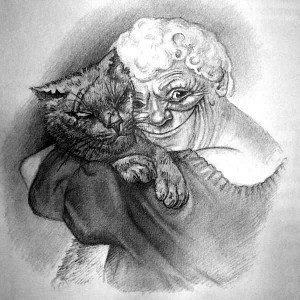 There's also romance in the book – a romantic storyline for each of the witches – and yet it's not the kind of romance that you tend to get in stories about fairies. We have the pragmatic, raunchy Nanny Ogg being courted by the younger and much shorter Casanunda the dwarf, who thinks he's worldly and experienced until he gets a load of what's going on in her brain. We get Ridcully the wizard, being soppy and sentimental about what could have been between him and Esmeralda Weatherwax in another lifetime, and almost getting them killed through his nostalgia, while she is hard-edged and practical, far more concerned with saving the world than getting all silly about a boy she once kissed. (oddly, that reminds me of the conversation Alisa and I had about Katniss and her blokes in The Hunger Games) Then there's Magrat and Verence – again, practicality overwhelming romance. Their awkwardness and inability to have actual conversations with each other is balanced out by them slowly figuring out how to be a married couple, and what 'king and queen' rules are going to have to be chucked out. There's a cute subplot based on the fact that neither of them are entirely sure how sex works and that he's sent off for a book about it, but basically it's a romance based on two people being terribly sensibly in love with each other, and I adore them.
There's also romance in the book – a romantic storyline for each of the witches – and yet it's not the kind of romance that you tend to get in stories about fairies. We have the pragmatic, raunchy Nanny Ogg being courted by the younger and much shorter Casanunda the dwarf, who thinks he's worldly and experienced until he gets a load of what's going on in her brain. We get Ridcully the wizard, being soppy and sentimental about what could have been between him and Esmeralda Weatherwax in another lifetime, and almost getting them killed through his nostalgia, while she is hard-edged and practical, far more concerned with saving the world than getting all silly about a boy she once kissed. (oddly, that reminds me of the conversation Alisa and I had about Katniss and her blokes in The Hunger Games) Then there's Magrat and Verence – again, practicality overwhelming romance. Their awkwardness and inability to have actual conversations with each other is balanced out by them slowly figuring out how to be a married couple, and what 'king and queen' rules are going to have to be chucked out. There's a cute subplot based on the fact that neither of them are entirely sure how sex works and that he's sent off for a book about it, but basically it's a romance based on two people being terribly sensibly in love with each other, and I adore them.
There should be more stories that show how some of the best romance can be practical, rather than all dramatic and eyes-across-a-crowded-room. Plus, when it comes down to it, Magrat saves her man. So there's a bit of epic folksong love story in there too. It's just not the best bit.
Have I mentioned how much I love this book? It's funny, clever, feminist and has so much to say about the power of story itself. The plot is perfect, down to the last detail. The relationship between beliefs and real magic is expressed powerfully, without suggesting that either of those things are more important than the other. And the romantic bits, such as they are, entirely serve the story of three extraordinary women.
"Elves are wonderful. They provoke wonder.
Elves are marvellous. They cause marvels.
Elves are fantastic. They create fantasies.
Elves are glamorous. They project glamour.
Elves are enchanting. They weave enchantment.
Elves are terrific. They beget terror.
The thing about words is that meanings can twist just like a snake, and if you want to find snakes look for them behind words that have changed their meaning.
No one ever said elves are nice.
Elves are bad."
Previous posts in this series:
Pratchett's Women: The Boobs, The Bad and the Broomsticks
September 9, 2011
Watching New Who: The Empty Child/The Doctor Dances
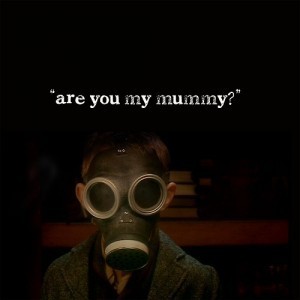 Watching New Who – in conversation with David McDonald, Tansy Rayner Roberts and Tehani Wessely
Watching New Who – in conversation with David McDonald, Tansy Rayner Roberts and Tehani Wessely
David is coming to New Who for the first time, having loved Classic Who as a kid. Tehani is a recent convert, and ploughed through Seasons 1 to 6 (so far) in just a few weeks after becoming addicted thanks to Matt Smith – she's rewatching to keep up with David! Tansy is the expert in the team, with a history in Doctor Who fandom that goes WAY back, and a passion for Doctor Who that inspires us all (plus a six-year-old daughter who is finding her own Doctors for the first time). We're going to work our way through New Who, using season openers and closers, and Hugo shortlisted episodes, as our blogging points. Just for fun! We have already talked about:
"Rose", S01E01
"Dalek", S01E06
"Father's Day, S01E08
THE EMPTY CHILD/THE DOCTOR DANCES – Season one, episodes nine and ten
The Doctor – Christopher Eccleston
Rose Tyler – Billie Piper
Captain Jack Harkness – John Barrowman
TEHANI:
Okay, so amidst the quite horrifying gasmasks (particularly when we SEE the transformation), the tears at the resolution, and the grins over the dancing doctor, one of my main impressions of this episode is boy howdy, is John Barrowman Tom Cruise's love child??! I really did NOT like him in this the first time around, but perhaps exposure mellowed me because he didn't bother me at all this time – I love his completely comfortable pan-sexuality and his innate flirtatiousness. He's not my pinup, but as a character, he's a lot of fun, and I think, later, we get to know that he is, as the Doctor says, bigger on the inside.
DAVID:
I feel like I must be missing something here, because I didn't think this episode was quite as good as "Father's Day". It was brilliant in places, but didn't quite have the sustained excellence of Father's Day which really only had one problem, the terrible special effects of the Reapers. Speaking of which, the special effects in this episode were great. The standout was the transformations, especially the first one. It was one of the OMG moments, it was absolutely horrifying!
I am not sure what it is, whether it is seeing a child in that monster role, but I found the child in the gas mask incredibly creepy. The looks of terror on the other children's faces, the way it used the phones and radios, the constant refrain of "Mummy…" – they all combined to create an atmosphere of rising horror. The scene where she is under the table, or when it is at the door and they are sitting around the table and Nancy is warning the Doctor not to go out there, well I can tell you I wouldn't have opened the door!
TEHANI:
I think I like the two parters because we get more character development and this helps to get emotionally involved with the story. Father's Day was good, but the longer length, for me, gives this the edge.
DAVID:
Jack is an interesting character. In the novels, the Eighth Doctor gets portrayed as a bit of a ladies man but Jack puts him in the shade. It's a fine line between charming and sleazy though, so I will be interested to see where they go with him. Obviously, he is a massive fan favourite and even after one episode I can see why that might be, there is a lot of charisma there and I loved the dynamic he introduces. But my first impression was to wonder a little what all the fuss was about.
TANSY:
This is my favourite story of this season and probably in my top 5 of all New Who! (though I have to admit, Season 5 gives it a lot of competition) Yes, I am a Moffat fangirl, more than any other New Who writer. I really enjoy the Doctor in this one, as he seems to be relaxing finally and enjoying his adventures, and the script gives us a great combination of history, horror, comedy and banter. Jack Harkness is a character that appeals to me, and while I enjoy him later and the darker path he takes in the Torchwood series, I do like coming back to the introduction of his character, when he was all young and innocent (well, in a smutty con man kind of way).
TEHANI:
I think I'm a Moffat fangirl too – every episode of the early New Who that I've loved turned out to be by him I think! I'm definitely with you on Jack, David. I was quite put off by him, first time around!
 TANSY:
TANSY:
I think that the Doctor and Rose on their own were in danger of becoming a bit too – well, for shorthand let's say a bit too Season 2 – as they overcome their initial prickles with each other, and now that they have resolved the blazing row in Father's Day, we could have ended up with a soppy honeymoon period. Instead we get Jack, who shakes things up between them and allows for some different character dynamics. Rose gets someone she can flirt with, without ever having to do anything about it, and the Doctor gets a younger male to compete with, something he seems to enjoy. Mickey and Adam showed us that the Doctor is competitive with other males, but neither of them were nearly smart or experienced enough to give him a run for his money – Jack isn't the Doctor's equal, but he is at least a challenge, and the banter between the two of them (epecially the sonic sequence) is very pleasing to my ears.
DAVID:
Speaking of banter, I loved the scene with Rose and the Doctor when they are waiting for Jack to teleport them out of the room. Next time I am trying to get out of being forced to dance I may use that "I'm trying to resonate concrete line"! It's a great little moment amidst all the chaos and danger.
Jack certainly introduces a whole new element to the mix, and I am really looking forward to seeing where that goes. As Tansy says, Jack is on a whole other level to Mickey and Adam, and the Doctor does seem to have a touch of "Captain envy".
TEHANI:
It's not quite jealousy, is it? It's more that he's got competition for her attention! Quite cute, demonstrating that the Doctor can be fairly socially inept (although not to the extent that Ten is, later on!) 
TANSY
Isn't that jealousy? It doesn't have to be a romantic or sexual thing, it seems more – CHALLENGE ACCEPTED. He does rather paw the ground when young males are in the vicinity.
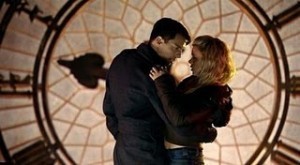 TEHANI:
TEHANI:
It's interesting that World War II is a location Doctor Who seems to head back to a bit – is it because it had such an impact on the people of Britain, it lies heavily on their consciousness? As a setting, it has power all of its own I think. It was interesting to note the juxtaposition in these episodes of the grim despair of the Blitz coupled with a heavy dose of humour – the Londoners are almost caricatures, and there's a lot of poking fun to offset the bleakness.
Nancy was brilliant. What a great character.
DAVID:
I loved the Doctor's little speech about how they scare the Hell out of him. I was brought up on stories of the Blitz (my grandmother was an ambulance driver and my grandfather was in military intelligence), and as the Doctor says it was an amazing moment in history.
I really enjoyed Nancy as well, she had a mix of vulnerability and strength that moved me deeply. And, the Doctor was right, what little kid wouldn't tear down the world to find his mummy?
TANSY:
It is noticeable how much World War II we're getting in New Who – not to spoil David or anything! I know we all felt with the recent "Victory of the Daleks" that the whole episode would have been much improved by adding a tiny Rose hanging from a barrage balloon in the longshot we got over wartorn London. But yes, it is absolutely one of the most important "within living memory" parts of British history, and continues to have resonance. I think also the new domestic focus of Doctor Who means that Blitz stories (rather than, say, trench warfare stories) have a particular significance. It's another suburban horror story really, it just happens to be a much older suburb that we visit this time.
 Nancy and her 'Broadway musical' host of children were incredibly touching and funny, though there is a wealth of sadness behind the story we actually see. Not only how she ended up a single Mum in wartime Britain, but all those kids who are living on the streets. The entire backstory of one, summed up in the line "I was evacuated. But there was a man…" The real darkness of this story is hidden in dialogue like that, where the kids wouldn't be aware of it.
Nancy and her 'Broadway musical' host of children were incredibly touching and funny, though there is a wealth of sadness behind the story we actually see. Not only how she ended up a single Mum in wartime Britain, but all those kids who are living on the streets. The entire backstory of one, summed up in the line "I was evacuated. But there was a man…" The real darkness of this story is hidden in dialogue like that, where the kids wouldn't be aware of it.
TEHANI:
Got goosebumps each time I watched that bit. I actually have a bit of a bug bear that everyone refers to Doctor Who as being for kids. Really? I mean sure, OUR kids watch it, but with us. Would we let them watch it on their own? And surely the airing time in many places puts it squarely targetting an adult audience? (I read somewhere that new episodes are airing at 9pm in the States?). I used to get scared watching it nearly thirty years ago, and I think it's scarier now, and there's more adult themes, yeah? Is the "children's show" tag just to trick people into getting addicted at a young age?! Sorry, off topic a bit!
TANSY:
People say that as a shorthand, and many people are introduced to it as children – but while it was originally produced with a child audience in mind, it was always intended as a 'family' show rather than something just for children – something to be watched with parents who could explain the tricky bits, I guess. It feels more adult now than it used to, discounting a couple of years in the 80′s when it was deliberately quite vicious in its violence. Having said that, my two year old loves it, but there you go!
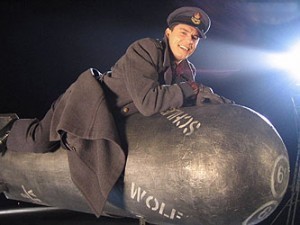 But let's talk about the title of the second episode, and the dialogue from which is springs: "the Doctor Dances." This would have to be the first Doctor Who story that overtly discusses sex, though it does so largely through banter, dialogue and heavy metaphor. We don't just get the discussion about the Doctor's moves, and Rose using the existence of Jack to start that particular conversation with the Doctor – but also the comments on the sex life of Mr Roast beef and the butcher down the road, as blackmailed by Nancy, and Nancy's own situation. Plus Captain Jack Harkness himself, with his chat up lines and the discussion of not only his own sexual orientation, but that of the entire future human race. Trust Steven Moffat to bring the sauce!
But let's talk about the title of the second episode, and the dialogue from which is springs: "the Doctor Dances." This would have to be the first Doctor Who story that overtly discusses sex, though it does so largely through banter, dialogue and heavy metaphor. We don't just get the discussion about the Doctor's moves, and Rose using the existence of Jack to start that particular conversation with the Doctor – but also the comments on the sex life of Mr Roast beef and the butcher down the road, as blackmailed by Nancy, and Nancy's own situation. Plus Captain Jack Harkness himself, with his chat up lines and the discussion of not only his own sexual orientation, but that of the entire future human race. Trust Steven Moffat to bring the sauce!
DAVID:
I don't consider myself a prude at all, but I think that the fact that they stick to metaphor and banter is a good thing. It's not something I see a need to have overly explicit in a show like Doctor Who. Adults know it's there, but children watching shouldn't be picking that up until they are ready for it (saying that, while I got the "but there was a man reference", I pretty much assumed that the butcher comment was to do with the black market. I thought for a second maybe she meant something else, then dismissed it. Shows how naïve I am!). That's been one of the fascinating things about some of the New Adventures and Eight Doctor Adventures, though, there has been a bit more freedom to explore things like that, with some mixed results (Dodo will never seem the same to me).
TEHANI:
And this is the bit that gets the old school fans uptight, right? Sexing up the Doctor? I think it's great – it's assists with that humanising aspect, and makes the whole show more relatable. There's a lot to love about the Doctor, particularly as his incarnations get, um, younger. And there's a lot to like about his companions too.
TANSY:
Not all old school fans! There are still a (diminishing) faction who still believe firmly that the Doctor should be asexual, and there's quite a bit of sneering/rumbling at the large number of female fans who adore to ship the Doctor with Rose or whomever, but all in all I think there's a lot more acceptance of the various kisses, for example, that crop up over the next six seasons, than might have been expected from the outcry about Eight snogging Grace in the 1996 TV Movie. Not that there's any kissing in this episode! Let's not go crazy or anything. Just dancing.
DAVID:
Well, as another old school fan I have to admit that I am a little uncomfortable with sexing up the Doctor too much, which I get the impression I may have to get over! It's not that I think he has to be asexual, I just would hate to think that all his interactions with his female companions have to have some sort of sexual component. There have been other companions in the past where there has been that sexual tension (Romana springs to mind, but maybe that was just that Tom Baker and Lalla Ward were in an off screen relationship) but I'd hate to see the idea of the Doctor as a father/grandfather figure fall completely by the wayside simply to try and give the show more of an edge. Perhaps I am old fashioned after all, but there was a sweetness about his relationship with some of the companions that I valued.
TEHANI:
You might have to squint and look away a bit, David 
TANSY:
I don't think you have to worry too much, while there are definite romantic implications here and there, the show never ignores the fact that he is the age he is, and an alien, and that there are so MANY reasons not to shag his cute young companion, or for him even to want to. The sheer awkwardness of human romantic expectations getting in the way of, well, resonating concrete and other Doctorish activities, is a great source of humour. I personally like the idea that the Doctor is perfectly capable of "dancing" but it's mostly something he doesn't think of because, well, he's terribly old, and you get bored with that sort of thing after the first 150 years.
DAVID:
One thing that I thought was done really well was that Jack's orientation is not what defines him. I remember when if there was an African-American in a TV show he or she was the "Token Black Guy" with that being their defining characteristic. Now, well in a lot of cases anyway, a character's race is almost incidental which I think is the point we know when we are starting to show true enlightenment. When they have "Captain Jack who is this and this, oh and also has this orientation", that seems more progressive to me than him simply being one dimensional. In real life people are more than a race or a gender or an orientation, TV characters should reflect that. So, well done to Steven Moffat.
TEHANI:
Agreed! I made a comment on Twitter at one point during my first watch about the fact that there are a lot of multi-race relationships, presented without comment by the show. It's great to see, at surface value – I know from reading on the internetz (thoughtful blogs by people far smarter and more socially aware than me) that there's still problems with both race and sexuality as these are shown in Doctor Who, but it's a good start.
TANSY:
This is something I really like about all of RTD's TV – in Casanova, for instance, the series he put out just before Doctor Who, there is a great deal of visible diversity, and I love that he makes a point of doing this with historical pieces in particular. But yes the mixed race relationships without comment are a great, positive element. I guess this does also reflect UK television as a whole, though? It's come a long way since the Doctor was last on TV in 1989.
I like the way that the whole show is so queer friendly now, and it's one of the things that's evident right back in Rose with the Doctor flipping through a celeb mag and saying "that'll never work, he's gay and she's an alien." Classic Who is very white and very – well, BBC conservative, I guess, and it was only starting to shake that off right before it was cancelled. Casual gay references through the first season of New Who make it feel very modern, and more connected to current culture. Plus it's what Russell T Davies does in everything he writes, and the BBC knew that when they headhunted him (his price was bringing back Doctor Who). Anything less would have been disappointing.
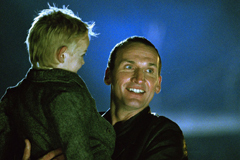 TEHANI
TEHANI
The Doctor is almost euphoric at the end, "Everybody lives!" It's actually really sad in itself, because it means that so many times, not everybody does, and I think this shows how it must weigh heavily on him.
DAVID:
When I got about five minutes from the end, I started thinking, "Surely not! A Doctor Who episode where no one dies?!" The universe may not implode when the Doctor dances, but strange things do happen! I think you are spot on, Tehani, you could see the joy the Doctor felt that for once everyone lived, that the world's salvation was not bought with human life.
TANSY:
A huge turning point for Eccleston's Doctor, whose journey so far has mostly been about moments of manic energy linking a whole bunch of tragedies together. And I have to say, it takes a very chilling and scary story, and adds a level of family-friendlyness to it. Which, as the mother of a six-year-old Who fan, I really appreciate. Raeli has informed me that the Empty Child is her least favourite Eccleston story 'because it's romancey between Rose and Jack and I am not a romancey child, I am an actiony child,' but The Doctor Dances is her favourite 'because everyone lives, Mummy.'
Of course, the 'everybody lives' line looks like it's going to be undercut in the final scene with the disappearance of Jack Harkness and the bomb. When I watch this story now, it's with a kind of nostalgia for the introduction this TARDIS crew, but at the time I first watched it, I honestly thought Jack was going to die. I love the scene where he screams at his computer, then accepts his impending death and implements the 'emergency procedure' (a cocktail), only for the camera to pan back into the TARDIS. Such a gorgeous moment!
DAVID:
I'm afraid I didn't get all of the impact of that scene, because I assumed he had to survive. But, I will admit, part of me was wondering whether the Jack of Torchwood might have been from the missing two years, and this was ultimate fate of Jack, time travel can have some confusing results!
TEHANI:
Ah yes, the problem with already knowing what comes after, watching it years after airing! It still packed a punch for me though, even with the dodgy CGI of the farewell scene! Loved that final bit when he hears the music.
TANSY:
Something New Who has done very well is to reclaim the idea of a male companion, which had been dropped for the last few TV Doctors in the 1980′s. While the male companions are generally given shorter shrift in the show (and far less media attention, as the image of the Doctor travelling with one girl is so iconic) I do generally like TARDIS trios more than duos. Apart from anything else, it means the companions can talk *about* the Doctor which can be excellent and necessary therapy. Jack is the only male companion of New Who who is allowed to be really dashing (David Tennant's Doctor uses up all the dash so no one else can have any), and the Ninth Doctor is very entertaining when he has someone to snark about. Jack is a far better snark-target than Rose, as it starts to look like bullying when the Doctor does it to her. (likewise it seems like bullying when he does it to Mickey, though I feel that Jackie, oddly, is fair game. Just me?)
DAVID:
When I look back on Classic Who and the dynamics of trios (or quartets) it usually seemed that it created a somewhat hierarchal feel. You would have the companions interacting on a fairly equal level, then the Doctor almost as someone they looked up to as an authority figure. You don't get that sense with Rose and the Doctor, though.
TANSY:
Two companions definitely makes the Doctor feel older and more alien.
DAVID:
As for the bullying thing, perhaps it is because it seems the Doctor is trying to belittle Mickey out of jealousy, while his banter with Jackie is more verbal jousting, where she is more than happy to try and give as good as she gets?
TANSY:
I think he just doesn't like Mickey very much! Or humans in general. Rose becomes the exception, and Jack the second (grudging) exception and we see The Doctor dancing around the idea of getting to like them again with occasional interactions, leading all the way up to the finale where he is totally soliciting a new companion from a random acquaintance!
TEHANI:
Jackie is more than equal to the snark I think – Mickey is shooting fish in a barrel  That said, Tennant's Doctor I thought was played more aloof, and thus he's even more likely to be hurtful in his snark, intentionally or otherwise. But we're getting ahead of ourselves. Sorry David!
That said, Tennant's Doctor I thought was played more aloof, and thus he's even more likely to be hurtful in his snark, intentionally or otherwise. But we're getting ahead of ourselves. Sorry David!
TANSY:
Oooh I don't agree with you at all, Tehani, but let's save that discussion for the Christmas Invasion!



